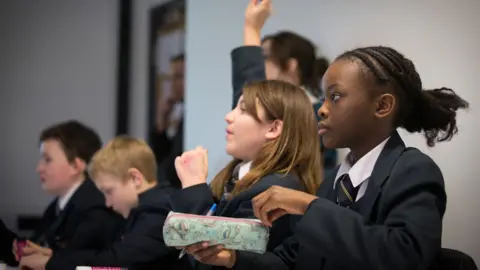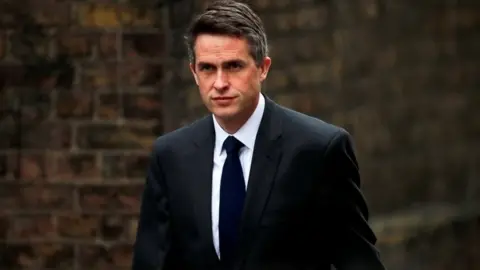Schools set for long-awaited cash injection
 Getty Images
Getty ImagesComplaints about school funding shortages in England are expected to be addressed soon by the government.
There are suggestions that about £4bn in extra funding, as a one-off, one-year cash injection, could be announced as early as next week.
In his Tory leadership campaign, Boris Johnson promised to reverse cuts in school funding.
Heads' and teachers' organisations have been warning of a worsening budget crisis for schools.
Election pledges
After making spending promises for the NHS and policing, the prime minister is next expected to turn his attention to improving funding for schools and colleges.
Putting more money into cash-strapped schools is likely to be seen as a popular grassroots measure ahead of a possible autumn general election.
This could still be delayed by Brexit wrangling, but there is an expectation that the government is imminently preparing to grasp the nettle on school budget shortages.
There has been a long-running campaign by school leaders protesting about inadequate funding.
This was backed by analysis from the Institute for Fiscal Studies that suggested schools had suffered budget reductions of 8% since 2010.
The Department for Education had rejected such accusations - saying that schools were receiving record levels of funding.
But teachers' unions and head teachers' campaign groups have maintained a constant challenge - writing directly to millions of parents about the financial difficulties facing schools.
It's a problem that has dogged the government's efforts to look effective in education.
Checking the fine print
Further protests by head teachers are expected in the autumn term - and school leaders will want to check the detail of any promises.
Will this really be extra money? Will it be available for this year?
 Getty Images
Getty ImagesWill it be targeted at the lowest-funded areas and financial pressure points such as special needs and sixth forms?
Will it do more than keep pace with rising costs?
Will it be separate from a spending boost for further-education colleges?
There have been various claims about the size of the funding gap - from about £4bn-£6bn to a forecast that it will grow to £12.6bn in the next few years.
The government will hope that the funding announcement will be enough to draw the sting from protests - as a short-term holding offer, until a longer-term, multi-year approach might be negotiated in the future.
Spending by focus group
Much of the groundwork for a funding announcement would already have been in place - as plans for a cash injection were under way in the final days of Theresa May's premiership.
The new education secretary, Gavin Williamson, will get the chance to deliver the extra money that has been demanded by schools.
 Reuters
ReutersThe spending taps are now apparently open - and Boris Johnson's administration is understood to have been examining where extra funding would be most popular.
Along with health and a more visible police presence, extra funding for schools has been seen as a measure with widespread public support.
There are also said to be concerns about behaviour in schools - so there could be more focus on discipline, linked to wider concerns about youth violence and petty crime.
There is also said to be support for more investment in vocational skills and training - and the further-education sector is anticipating its own significant increase in funding this autumn.
Geoff Barton, leader of the ASCL head teachers' union, said: "We would very much welcome any additional investment in education as this is desperately needed.
"It must be the start of a long-term phased uplift in funding to reverse education cuts and repair the damage that they have caused.
"We have worked with other education organisations to calculate that £12.6bn is needed by 2022-23 across early years, primary and secondary schools, 16-19 education and high needs."
